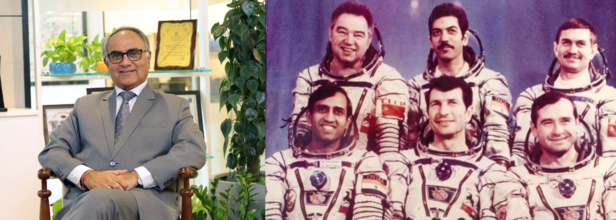
Are You Eligible For The 2025 COVID-19 Vaccine 'Spring Booster' Dose?
As we move into spring season, immunity gained through earlier COVID-19 vaccination can start to drop. The virus, although no longer causing widespread lockdowns, is still a significant health hazard, particularly to older adults and those with weakened immune systems. To keep vulnerable people safe, the NHS is once again rolling out the COVID-19 'Spring Booster' jab in 2025.
It has been five years ago that the world fell prey to the COVID-19 pandemic. During the bizarre and bewildering days of early 2020, a frightening new virus turned our world upside down. At that time, it seemed certain that everything about our lives, the manner in which we lived, breathe, speak, meet, attend colleges, offices, schools, would be irreversibly altered. Five years on, although the burden of COVID-19 was catastrophic, killing 220,000 in the UK and 7 million globally, we cannot dismiss how it affected in our social attitudes, faith, relationships, and these all are still unraveling.
This article considers the eligibility, the urgency of booster jabs, and how you can book an appointment if you're eligible.
The COVID-19 vaccine has been instrumental in preventing severe illness, hospitalization, and death. Figures released by the UK Health Security Agency (UKHSA) from last spring's booster campaign indicated that those vaccinated were 45% less likely to be hospitalized with COVID-19. This demonstrates the booster's ability to prevent severe illness and aid public health measures.
Though COVID-19 no longer controls daily life, the virus still presents considerable threats, especially to high-risk groups. The booster dose acts as a safety net, keeping immunity levels high against new variants.
Who is Eligible for the 2025 Spring Booster?
Eligibility for the 2025 spring booster continues to be in line with previous years, with a special emphasis on high-risk groups. The following are eligible:
Adults 75 years and over: If you are 74 but will be 75 by June 17, 2025, you are still eligible for the booster.
Care home residents for older adults: Due to the increased risks in group living environments, care home residents are eligible for the booster.
People aged six months and above with a weakened immune system: Immunocompromised individuals, such as those receiving certain medical treatments, are eligible for the booster.
These are the eligibility criteria for all four countries of the UK—England, Scotland, Wales, and Northern Ireland.
Booking Your Spring Booster Appointment
The NHS has simplified booking the booster dose for eligible people. The 2025 spring vaccination campaign will take place from April to June, with slightly different timetables throughout the UK:
England: April 15 – June 30
Scotland: April 15 – June 30
Wales: April 15 – June 30
Northern Ireland: 15 April – 30 June
The NHS will invite you by text, email, app reminder, or letter. You don't need to wait to be invited—appointments are available to book directly through the NHS website, the NHS app, or on 119.
Also, most pharmacies provide private COVID-19 jabs for individuals who are not eligible for the free NHS booster but would like to boost their immunity.
Which COVID-19 Vaccines Are Being Used?
The NHS will be using vaccines from two main manufacturers:
- Pfizer-BioNTech
- Moderna
Both vaccines have been shown to offer robust protection against severe illness and hospitalization. The NHS recommends that people accept the vaccine that is provided, as both are of high safety and efficacy standards.
What is Immunosuppression and Eligibility?
People with weakened immune systems might experience confusion in assessing eligibility. Immunosuppression can be caused by several medical conditions and treatments, and not all immunocompromised patients automatically fall under NHS eligibility.
The Green Book, which is published by the UKHSA, provides detailed eligibility criteria for immunosuppressed individuals. Those who generally qualify are:
- Organ, bone marrow, or stem cell transplant recipients
- Patients receiving chemotherapy or radiotherapy
- Patients receiving immunosuppressive or immunomodulating therapy
- Those with systemic steroid use of more than one month
- HIV-positive individuals
- Individuals with genetic disorders of the immune system
For a full list and more information, individuals can go to nhs.uk/get-vaccine.
Should You Get the COVID-19 Booster Shot?
Getting the COVID-19 spring booster is a proactive measure to protect personal and public health. Being up to date with vaccines, high-risk groups substantially reduce their risk of severe illness and hospitalization.
While younger, healthier populations may not require regular boosters, older adults and immunocompromised individuals benefit greatly from enhanced immunity. With millions of people eligible across the UK, widespread participation in the booster campaign will help maintain community protection and prevent undue strain on healthcare services.
The COVID-19 pandemic might have entered an endemic phase, but the virus remains dangerous to vulnerable persons. The 2025 spring booster provides a necessary layer of protection for those at higher risk and continues to provide immunity against severe illness.
If you or a loved one are eligible for the booster, make an appointment as soon as possible. Whether through the NHS or private clinicians, this easy action can ensure a real difference in your health and wellbeing.
Disclaimer: The article is for information purpose only and was sourced and updated as per the UKHSA website. Consult a healthcare professional before getting vaccinated.

'I Felt Like I Was Going to Die'-Oprah Winfrey’s Shares Her Menopause Struggle
For most women, this reality is what menopause feels like, a time when hormonal changes impact everything from sleep routines to mood stability. Oprah Winfrey recently shared her own personal battle with menopause, exposing how it left her unable to read her favorite books or even host her famous book club. In a candid conversation, Winfrey explained how the overwhelming symptoms—especially heart palpitations and an inability to concentrate—left her feeling like she was “literally going to die every single night.”
It’s a topic that’s often kept behind closed doors, but menopause affects millions of women globally. According to the National Institute on Aging, menopause is reached when a woman has had no period for 12 months in a row, normally between the ages of 45-55, and may create a variety of symptoms ranging from hot flashes to emotional upset. Oprah's announcement of her own menopause experience highlights the not-so-well-known symptoms and raises awareness of the need for greater information and support. Let's take Oprah's journey and see how we can learn more about and cope with this natural but too-often-misunderstood phase of life.
But media mogul Oprah Winfrey is breaking that. In a recent interview, Winfrey, 71, spoke candidly about her own menopause experience, describing an ordeal so overwhelming that she thought she was "going to die every single night."
Winfrey's confession is not simply another celebrity revelation—it's a wake-up call for millions of women across the globe who suffer from menopausal symptoms in ignorance, without proper medical attention, or public support.
Menopause, that phase of life when a woman's menstrual cycle permanently ceases because of the decrease in estrogen and progesterone levels, is usually coupled with symptoms of hot flashes and night sweats. But in Winfrey's case, it was different—though no less unsettling.
One of the most surprising and disturbing symptoms that she experienced was one of inattention. An avid reader since childhood and the face of Oprah's Book Club, she discovered that she couldn't read.
The worst for me, this is when I realized I really was in trouble, is when I couldn't focus reading," Winfrey explained to ABC News' Kayna Whitworth. "I adore reading so much, but I abandoned the book club because I could not focus when I was reading. I could no longer complete a book.
It wasn't until she began hormone therapy with estrogen that she regained her concentration. "I brought back [the book club] when I began taking estrogen because I could concentrate again, but I actually never mentioned that before," she confessed. "It makes me want to cry."
Lesser-Known Symptoms of Menopause
Although night sweats and hot flashes are universally acknowledged as symptoms of menopause, other physical and psychological consequences tend to go unmentioned. Winfrey felt palpitations of the heart—a symptom she never correlated with menopause.
"I did not have night sweats, and I did not have hot flashes, but I had never heard that palpitations [were] a symptom of menopause," she explained. "When I was going through it, there was nothing. There was nobody."
This absence of knowledge concerning the entire range of menopausal symptoms is a crucial concern. Menopause influences each woman uniquely, with some suffering from anxiety, depression, insomnia, mental fogginess, or even arthritis, says the National Institute of Health (NIH). And though it touches everyone equally, menopause has been among the least talked about and most under-studied topics in women's health.
Committed to making sure that other women do not have to endure in silence, Winfrey is leveraging her platform to ignite a long-overdue discussion. Her new Hulu special, An Oprah Winfrey Special: The Menopause Revolution, seeks to inform and empower women on menopause, offering expert advice and real-life stories to guide them through this stage of life with confidence.
She also tweeted to highlight how crucial it was to discuss menopause. "When I underwent menopause, I couldn't sleep for two years. I couldn't concentrate. I couldn't read my favorite books. I had heart palpitations. Nobody informed me about this. Now we're discussing it, so no woman suffers," she posted on Facebook.
Winfrey's advocacy is part of a larger effort to make menopause conversations mainstream and better healthcare responses. Women should have access to proper information and healthcare providers who seriously consider their symptoms.
What Women Need to Know About Seeking the Right Medical Support?
Winfrey's experience teaches an important lesson: women need not be afraid to get a medical consult when they are experiencing symptoms of menopause. "Because it hits every cell in your body, the first time you have any of the symptoms, that's when you need to go go find a doctor who will hear you, listen to you, and take action for you," she encouraged.
Far too frequently, women's menopausal symptoms are downplayed, and they must cope with the changes by themselves. Professionals advise going to see a gynecologist or a menopause specialist as early as perimenopause—the pre-menopause phase—so that possibilities such as hormone therapy, lifestyle modifications, and other forms of treatment can be discussed.
Oprah Winfrey's honest narrative about her battle with menopause is a call to change the way society understands and responds to this natural phenomenon. It's about tearing down the taboo and myth surrounding menopause so that future generations of women will be better equipped and empowered.
With powerful voices such as Winfrey at the forefront, menopause is no longer a silent battle—it's a dialogue that must be heard.

(L to R) Lt Gen Dr Vimal Arora; Rakesh Sharma with Soyuz T-11 crew (source: Russian House, New Delhi)
Exclusive: Astronaut Rakesh Sharma Had To Get His Wisdom Tooth Extracted Before His Trip To Space
In an exclusive interview with Health and Me, Lt Gen Dr. Vimal Arora who is the Chief Clinical Officer (CCO) at Clove Dental talked about his experiences of treating the former Presidents of India and the time when he served as one of the doctors at the Air Force Institute of Dental Sciences in Bengaluru.
In 1982, Rakesh Sharma was selected as a cosmonaut for a joint Soviet-Indian spaceflight. With him, ex IAF Pilot Ravish Malhotra was also selected who was trained to fly on that mission as a backup for Rakesh Sharma. For this mission, Sharma was rigorously trained at Moscow's Yuri Gagarin Cosmonaut Training Center for two years. He also underwent a test for claustrophobia in Bengaluru's Indian Air Force facility with being locked in a room for 72 hours for the test.
It was there only when Dr Arora had come across the case. "I was young in Bengaluru, and we had these India astronauts who would go along with Russian astronauts and the medical were also going on. At that time, I distinctly remember Rakesh Sharma and Ravish Malhotra and only one of them were supposed to go," he shares.
It was there when Dr Arora got caught in a debate with regards to their medical checkup. It was on whether the astronauts should have their wisdom tooth removed.
"Their dental checkups were done and we were told that their wisdom teeth had to be taken out. We were fighting with them (Russian doctors)," Dr Arora shares.
"I said, 'they are perfectly fine, why is there a need to extract their tooth? It is not going to cause any trouble.' But it was made very clear from the Russians and their team of doctors and dentists that wisdom teeth must be removed."
The reason for this was, as Dr Arora explained, the astronauts, the mission and everyone else who have invested in the spaceflight could not let a wisdom tooth ache become a issue to cancel the trip. Even if there is a chance that this may cause tooth pain, the trip had to be called back and the team could not afford that.
"This is when I learned the wisdom tooth has to go away. It was a different lesson for me at that time," he shares.
After that, Dr Arora says that many more things had enlightened him, including the first intra oral full mouth x-ray machines which had also been imported there.
He says that dentistry has changed unimaginably. The amount of technology that dentists used is not used in any other health sector.
His experiences do not just end there. He has also treated the former Presidents of India including Dr APJ Abdul Kalam and Dr Pranab Mukherjee.
"What makes them stand apart was the simplicity with which they treated the doctor. I remember that I was more nervous when I had to talk to Dr Kalam. But he always had this child-like simplicity and child-like curiosity. He always left with some kind of messages and it gave me a different lesson in my life."

Photo by researchers at UCSF and UC Berkeley shows Ann, a participant in a study on speech neuroprostheses, in California in 2023. (Noah Berger/UCSF, UC Berkeley via AP)
A Brain-Computer Interface Made A 47-Year-Old Stroke Survivor Speak Again After 18 Years; Here's How It Works
In this immensely changing space of technology and medical sciences, scientists have now developed a groundbreaking device, which can translate thoughts into spoken words in real time. This experimental brain-computer interface (BCI). This could also help people who are unable to speak to regain their voice.
The implant can detect brain activity which is related to speech and convert it int words. Unlike previous BCIs, which often would have delays, this new system can process speech almost instantly. It can also make conversations smoother and more natural.
Has This Technology Been Tested? What Were The Results?
In a clinical trial, doctors implanted this device in a 47-year-old woman who had lost her ability to speak due to a stroke 18 years ago. During this process, electrodes were placed on the speech center of her brain. This captured neural signals.
Once the implantation was done, the researchers trained the system to recognize her brain activity. They used artificial intelligence (AI) to translate her neural signals into speech sounds. They were also able to recreate the sound of her original voice using the recordings the woman had before she suffered the injury.
What About Real Time Speech Conversion?
The older BCIs required users to think of an entire sentence before translating it. However, with this system, the processing of speech is done in smaller segments. In every 80 milliseconds, which is about half a syllable, the implant sends data for immediate translation. This way the implant allows for a more natural and fluid conversation experience.
AI has been playing a crucial role in medicine. For this, AI plays a crucial role in the success of this implant. It deciphers neural activity and matches it to specific sounds and words. The system is also similar to speech-to-text technology which have been used in smartphones. However, this one has been tailored to interpret brain signals instead of spoken words.
ALSO READ: Woman Thought It Was Just Grief And Anxiety, Until ChatGPT 'Diagnosed' Her With Blood Cancer
What More Could Be Done In Future? Are There Any Exciting Future Prospects?
This is a new approach, especially to brain-computer communication. In fact, scientists and healthcare professionals believe that it could revolutionize the way people with speech impairments interact with the world. While it is currently in the experimental phase itself, there is a lot of hope that researchers have with its results, along with the continuous funding and new developments. The researchers hope that soon this technology will be available for medical use. The soon for them is within a decade.
While results are promising, more research is required to refine the technology and to make it more accessible for a wider audience, especially those who are disproportionately affected by such conditions. Scientists also aim to improve accuracy, expand vocabulary recognition, and ensure the implant works for various speech impairment.
The ability to translate thoughts directly into speech is a major advancement in neuroscience and assistive technology. With further development, this innovation could restore communication abilities for people who have lost their voices, opening new possibilities for independence and interaction.
© 2024 Bennett, Coleman & Company Limited

